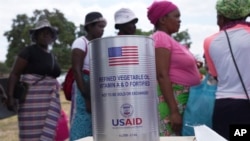The United Nations says it will support Zimbabwe in mobilizing resources to tackle the El-Nino-induced drought.
In its response to President Emmerson Mnangagwa’s Declaration of the State of Disaster on Wednesday, Edward Kallon, UN Resident and Humanitarian Coordinator, said efforts are underway to formalize a response plan focusing on food security, health, education, shelter, and other essential areas to address the needs of those affected by the crisis.
Kallon said the drought crisis has far-reaching consequences across various sectors such as food and nutrition security, health, water resources, education, and livelihoods, highlighting the urgency of the situation.
He said there is need to enhance climate adaptation efforts to address the effects of such extreme weather events and to combat the overarching climate crisis.
“The UN recognizes the Government of Zimbabwe's and that of the humanitarian partners for proactive planning and early actions to bolster community resilience. So far, the UN as part of the national anticipatory action and early response allocated US$ 5 1 million from the Central Emergency Response Fund (UNCERF) in December 2023. The sectors targeted with the advance allocation, include, Water, Hygiene and Sanitation (WASH), Health including response to the Cholera outbreak, protection, as well as agriculture and food security, and nutrition.”
Millions of Zimbabweans are facing a ravaging drought that has led to widespread hunger amid serious water shortages.
President Emmerson Mnangagwa declared Zimbabwe's drought a national disaster says the country needed more than $2 billion in aid to feed millions facing hunger, according to Reuters.
Reuters reports that Mnangagwa's statement follows similar announcements by Zambia in late February and Malawi in March, as drought induced by the El Nino global weather pattern triggers a humanitarian crisis in southern Africa.
More than 2.7 million people in Zimbabwe will go hungry this year, Mnangagwa told journalists at the state house in Harare, adding that 80% of the country had received poor rains.
El Nino is a naturally occurring weather phenomenon associated with a disruption of wind patterns that means warmer ocean surface temperatures in the eastern and central Pacific.
Most provinces in Zimbabwe have experienced crop failure since November, with hotter areas declaring grains such as maize a write-off.





Forum